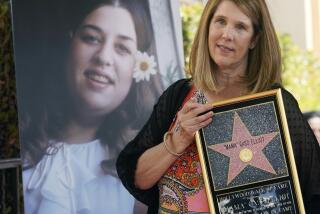Jethro Tull’s Ian Anderson: Never Too Old to Rock ‘n’ Roll
Ian Anderson likes the fact that his group, Jethro Tull, now plays before mostly familiar faces.
“After all this time, it’s reassuring that there are people there who want to see us--and they are there to see us,” Anderson said over the phone from his home in Great Britain during a break between the European and American Jethro Tull tours.
“It’s not as perhaps was the case in ’73 or ‘74, when the audience was comprised in considerable part of the idly curious.”
Back in 1968, the band, formed of equal parts of Olde English folk, progressive rock and American blues, was hailed as “the new Cream” by the British press.
Its albums--such as “This Was” in 1969, “Benefit” in 1970, “Aqualung” in 1971 and “Thick as a Brick” in 1972--were as popular in America as they were in England.
Since then, Anderson, known for his one-legged flute playing and other odd stage antics, has become the only remaining original member.
This year’s version of Tull--the 13th different incarnation by one count--includes two members of Fairport Convention, Dave Pegg and Martin Allcock, as well as Martin Barre (a member since 1969) and Doane Perry.
Although the band does well enough now, it is nothing like those heady days in the early ‘70s.
“It was sort of the group you ought to see that week,” Anderson recalled with not much fondness. “A lot of people would come just to see what the fuss was about.
“I suppose it was a bit like the Stones playing out there now. A lot of people will see the Stones just because they don’t want to miss them, not because they’re confirmed Stones fans.”
Those who come to the band’s shows now know what to expect, he says, “because people are not ambivalent about Jethro Tull. They either like us or they hate us.”
Tull has been kept alive because of continuing airplay of its best-known material on FM rock stations. But that does not tie the band, who has just released its 17th album, “Rock Island,” to just the oldies in concert, Anderson said.
Luckily, he said, “The songs that we play on stage that are old ones are ones that have a musical currency that are valid now, and lyrically not rooted to a historical niche.
“When I sing ‘Aqualung,’ it doesn’t have anything at all to do with 1971,” he said. “For me, nostalgia goes back to last night at about quarter to 11--that’s how recent the song is to me when I sing it.”
It’s also lucky that most of his songs are about six minutes long and allow for a bit of improvisation. “One reason I’m not bored with it is because they’re quite difficult to play.”
And the improvisation is done “basically so we don’t get bored.”
“I don’t have a personal problem with nostalgia. I don’t have things like gold albums and pictures and memorabilia in my possession,” he said. “For me, it’s all about the last show or the next show.”
The boxed set “20 Years of Jethro Tull” was requested by and eventually compiled by fans who wanted a commemoration of the milestone by their favorite group.
From 100-odd songs fans wanted to hear, Anderson chose the final 75 tracks that appeared on the collection. The band put the final touches on some incomplete recordings. All but eight tracks had not been widely available previously.
Tull’s longevity also may be due to the fact that the group is not as lofty as the Stones or the Who. That way, Anderson chuckled, “If you fall from grace from time to time, you haven’t got quite so far to fall, in the sense of Bruce Springsteen or somebody else.”
If the fall from grace came, Anderson has a large thriving business to fall back on: a salmon farming and processing plant in Strathaird, Scotland.
“The reason I have business interests is not because I’m looking for an alternative means of earning a living; it’s more to do with the challenge of doing something with that money,” he said.
Rather than store it in a bank or blow it on fancy cars, “I’m one of those people who believe in turning it around and putting it back in the system, and trying to do something to give other people the opportunity to create their own wealth.”
A Grammy Award earlier this year for Jethro Tull turned into an odd kind of fall from grace, because many believed that in the newly created heavy metal category, Metallica was more deserving.
“The name of the category was ‘hard rock or metal,’ and quite clearly Jethro Tull is not a metal band. Jethro Tull is a rock band, and, dare I say, we’re more likely to be grouped with the hard rock than the soft rock. If you put us alongside Bruce Hornsby and the Range or the Eagles, I would have to say we’re rougher-edged.
“I was surprised that we were nominated because we’ve never been nominated before,” Anderson said.
“I’m very pleased,” he said, “But it did tend to get bad reaction from both the press and the Metallica fans who lined the galleries of the event. It was certainly not a popular win, no.”
Compared with Metallica, Jethro Tull must seem to be some gnarled, elderly rock group (that’s how band members already looked, via makeup, on the first album), whose “Too Old to Rock ‘n’ Roll, Too Young to Die” album--released in 1976--has some resonance in a year when 40- and 50-year-olds dominate the rock concert stage.
To all this, Anderson, age 42, says: “When I was 15 or 16 years old and became interested in music, my interest lay primarily in American black blues artists,” he said. “And it completely escaped me that these people were already in their 50s, 60s and 70s at the time I started listening to them. It just seemed absolutely unimportant.
“It was the music and the emotion and the thing it was saying that was intriguing. I never actually gave a second thought to how old these people were.
“Really, there comes a point where all this sort of age thing becomes as irrelevant as one’s general state of health,” Anderson said. “That’s really the only factor ultimately.”
More to Read
The biggest entertainment stories
Get our big stories about Hollywood, film, television, music, arts, culture and more right in your inbox as soon as they publish.
You may occasionally receive promotional content from the Los Angeles Times.






